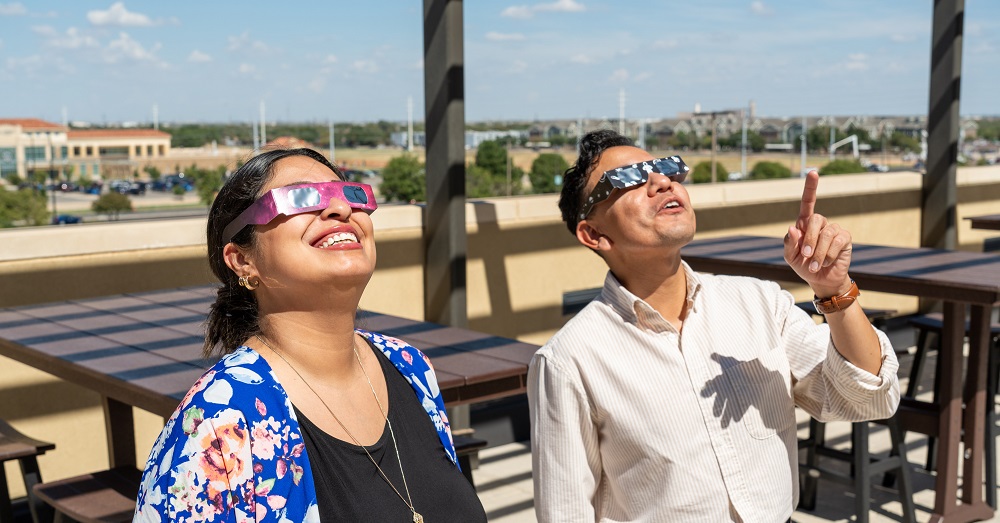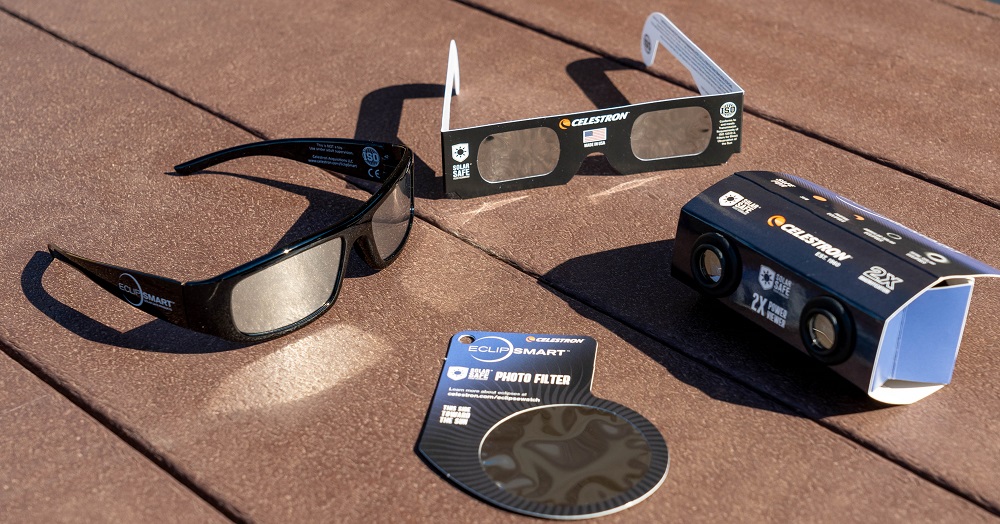Protect Your Eyes During the Annular Eclipse
Texas Tech Physicians Expert Offers Tips on Enjoying the Celestial Event

All eyes will be on the path of the upcoming annular eclipse Oct. 14, but a Texas Tech Physicians expert advises the public to take precautions.
An annular eclipse occurs when the moon passes directly in front of the sun, but the moon is too small to completely obscure the sun, leaving a ring of sunlight visible. During an annular eclipse, the sun is still very bright and that radiation can cause permanent damage to reading and driving vision.

Kelly Mitchell, M.D.
“An eclipse is such an interesting astronomical event that we as human beings are so curious that we want to look at it,” Kelly Mitchell, M.D., Texas Tech Physicians ophthalmologist, said. “That heightens the desire to look, especially for young people who don’t understand the risks. There are significant and serious risks of injury to the eye if you look at the sun generally, but really specifically with regard to solar eclipses.”
Mitchell said that looking at an eclipse with unprotected eyes can cause serious and permanent damage to the retina, the light sensitive tissue at the back of the eye.
“If you were looking long enough at the sun or an eclipse and then you notice a lingering distortion of your central vision, you could be diagnosed with the disease known as solar retinopathy,” Mitchell said. “There is no effective treatment for that and you would be left with a permanent and potentially significant loss of your central vision.”
To safely view the annular eclipse, Mitchell recommends using specially designed eclipse glasses or a solar filter which meet the International Organizations for Standardization (ISO) 12312-2 standard. He adds that it is important to buy eclipse glasses and filters from a reputable source and to keep them in good condition. There should never be a nick, hole or crease in the filter; it is a very delicate and dark membrane.

Mitchell recommends specially designed eclipse glasses or a solar filter which meet the ISO 12312-2 standard
“There are two general ways to look at an eclipse,” Mitchell said. “The direct way is when you look directly at the eclipse through the proper protective filter over your eyes. The indirect method is when you’re positioning the eclipse over your shoulder and project the image of the sun through a hole onto a white surface, such as a sheet of white copy paper or a smooth concrete surface.”
Two ways to never view an annular eclipse is via smartphone and through binoculars and telescopes. Mitchell said that the eclipse filter or app is meant to protect the device’s lenses. Taping ISO 12312-2 filters over binoculars or telescopes is only effective at magnifying the light.
“The only way you should ever consider using a cell phone is if you’re looking at the eclipse through the ‘selfie mode’ where the eclipse is coming in over your shoulder with your back to the eclipse.”
Other tips and warnings:
- If you use a welder’s helmet to view the eclipse directly, make sure it is equipped with a 14 or darker filter.
- Even the darkest sunglasses are not safe to use to view an eclipse.
- A plastic colander or anything else (not metal) with a bunch of holes can be used as a pinhole projector.
- Limit the time you spend directly viewing the eclipse to reduce the risk of eye strain.
- Keep a close eye on children to ensure they do not remove their eclipse glasses or use inadequate eye protection.
- Find a safe viewing location.
- If you experience vision problems after viewing the eclipse, see an eye doctor immediately.
Related Stories
The John Wayne Cancer Foundation Surgical Oncology Fellowship Program at Texas Tech University Health Sciences Center Announced
TTUHSC is collaborating with the John Wayne Cancer Foundation and has established the Big Cure Endowment, which supports the university’s efforts to reduce cancer incidence and increase survivability of people in rural and underserved areas.
Making Mental Health a Priority in the New Year
Sarah Mallard Wakefield, M.D., a psychiatrist with Texas Tech Physicians, talks about strategies to combat widespread and growing anxiety.
TTUHSC Dean to be Inducted into the National Academies of Practice as Distinguished Fellow
Gerard E. Carrino, Ph.D., MPH, dean of the TTUHSC Julia Jones Matthews School of Population and Public Health, will be inducted into the National Academies of Practice (NAP) as a Distinguished Fellow of the Public Health Academy.
Recent Stories
The John Wayne Cancer Foundation Surgical Oncology Fellowship Program at Texas Tech University Health Sciences Center Announced
TTUHSC is collaborating with the John Wayne Cancer Foundation and has established the Big Cure Endowment, which supports the university’s efforts to reduce cancer incidence and increase survivability of people in rural and underserved areas.
TTUHSC Receives $1 Million Gift from Amarillo National Bank to Expand and Enhance Pediatric Care in the Panhandle
TTUHSC School of Medicine leaders accepted a $1 million philanthropic gift from Amarillo National Bank on Tuesday (Feb. 10), marking a transformational investment in pediatric care for the Texas Panhandle.
Texas Tech University Health Sciences Center Permian Basin Announces Pediatric Residency Program Gift
TTUHSC Permian Basin, along with the Permian Strategic Partnership and the Scharbauer Foundation, Feb. 5 announced a gift that will fund a new pediatric residency.
